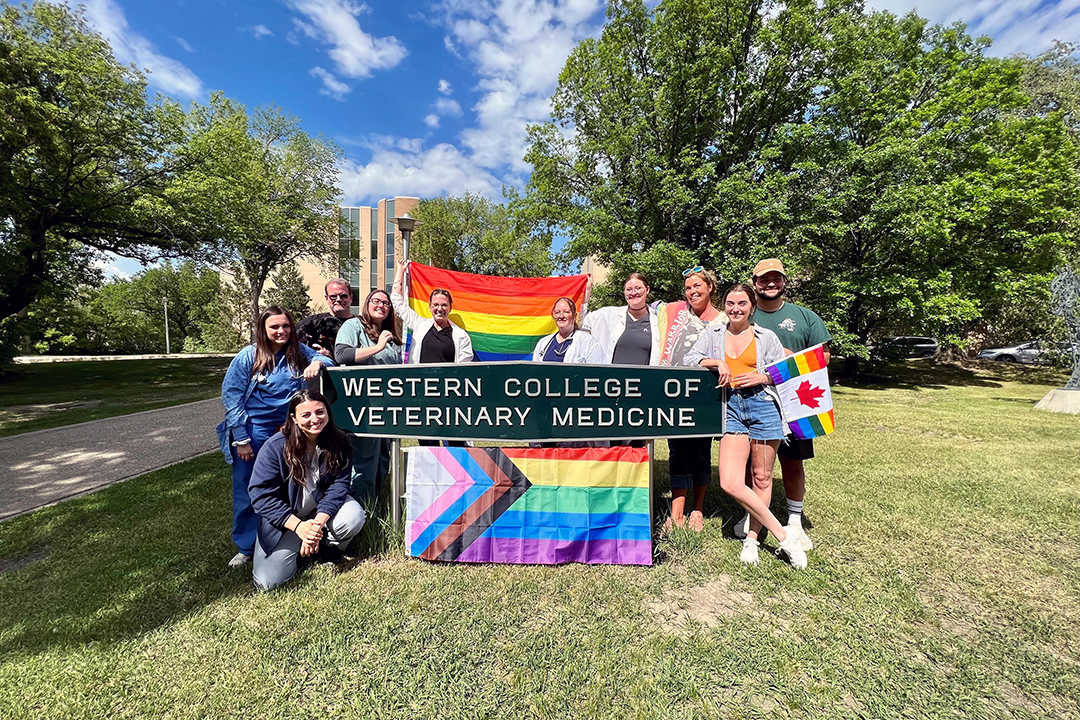
WCVM PRIDE club creates space for community
When Madlyn Lung sent an email message to the entire Western College of Veterinary Medicine (WCVM) community asking about interest in a Pride club, she was overwhelmed by the response.
By Jeanette NeufeldIt was early 2020, and she was met with enthusiasm by those who wanted to see a space created for members of the two-spirit, lesbian, gay, bisexual, pansexual, transgender, queer, questioning, intersex, asexual, aromantic, agender, non-binary, and gender non-conforming (2SLGBTIA+) and allied community to support one another at the college.
“I probably got 40 emails from faculty, staff and students who said, ‘Yes, this needs to happen,’” says Lung, who is now in her fourth year of the Doctor of Veterinary Medicine (DVM) program.
Visible representation of the 2SLGBTIA+ community isn’t common in the veterinary profession, and the club is working to change this, says Billy McLaughlin, a fellow fourth-year student who is co-president and co-founder of WCVM PRIDE alongside Lung.
“Every person in the WCVM should feel empowered to express their true selves regardless of how they identify. We hope to recognize, celebrate and amplify our 2SLGBTQ+ community.”
“I think overall, it’s just to try to improve inclusivity of this community within vet med and to provide support for new students who are in the community and need it. Vet school is hard enough as it is — you don’t have to feel discrimination as well,” says Lung.
The club’s leadership strives to create an environment at the WCVM that feels safe for people to be fully themselves, and to hold space and provide support for those who don’t yet feel comfortable expressing their gender or sexual identities.
“I want people to come into my office and feel comfortable enough to come and talk and say, ‘This is who I am,’” says Tyler Moss, staff adviser for WCVM PRIDE. Moss has supported many people at the college for more than a decade.
Including WCVM staff and faculty in the club was important, says Lung, as it provides continuity and mentorship for the students participating.
“I just think it’s important because there are individuals who need to feel that support, and it’s nice to have people — especially staff and faculty — you can look up to who went through the same struggles that you did being in the 2SLGBTIA+ community,” says Lung. “It’s all about inclusivity.”
While the COVID-19 pandemic created some hiccups in the club’s launch, the support soon snowballed, and its leadership found creative ways to keep the energy of the club going. They held a gay bingo night online, crochet nights, hosted educational talks online and created open Zoom rooms where people could seek support.
The club’s leadership say another important goal is to provide education for the entire WCVM community so that as students graduate, they are empowered to become advocates and allies.
“It goes further than just within the WCVM; as we go out into the field, we need to ensure we are establishing a safe environment for both the veterinary team and the clients we serve,” says McLaughlin.
“We are seeing more resources for 2SLGBTQ+ veterinary professionals, but I think clinic culture needs to reflect these efforts. To increase representation, I think it's important to consider both future 2SLGBTQ+ folks but also those already in the profession who don't feel like they can be their authentic selves.”
McLaughlin and Lung hope that the club’s work will continue beyond their tenure as students, and that they’ve planted a seed for the future that results in more diversity, equity and inclusion at the WCVM.
“We envision a more inclusive and accepting college for future students,” says McLaughlin.
For more updates on the PRIDE club, follow @WCVMPRIDE on Instagram or email wcvmpride@gmail.com to get involved.
WCVM community members who are looking for support or resources are welcome to contact the club’s executive or staff advisers. Community resources such as OUT Saskatoon or the University of Saskatchewan Student Union (USSU) Pride Centre are also available.
Crisis contacts:
Saskatoon Mobile Crisis: 306-933-6200
Crisis Text Line: text HOME to 74174
Trans life line: (877) 330-6966
Kids help phone: text CONNECT to 686868 or call 1-800-668-6868
